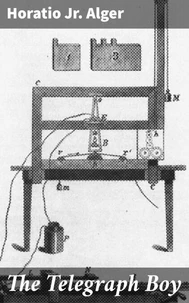Joe the Hotel Boy; Or, Winning out by Pluck
Par :Formats :
Disponible dans votre compte client Decitre ou Furet du Nord dès validation de votre commande. Le format ePub est :
- Compatible avec une lecture sur My Vivlio (smartphone, tablette, ordinateur)
- Compatible avec une lecture sur liseuses Vivlio
- Pour les liseuses autres que Vivlio, vous devez utiliser le logiciel Adobe Digital Edition. Non compatible avec la lecture sur les liseuses Kindle, Remarkable et Sony
 , qui est-ce ?
, qui est-ce ?Notre partenaire de plateforme de lecture numérique où vous retrouverez l'ensemble de vos ebooks gratuitement
Pour en savoir plus sur nos ebooks, consultez notre aide en ligne ici
- Nombre de pages105
- FormatePub
- ISBN859-65--4704663-9
- EAN8596547046639
- Date de parution02/06/2022
- Protection num.Digital Watermarking
- Taille412 Ko
- Infos supplémentairesepub
- ÉditeurDIGICAT
Résumé
In "Joe the Hotel Boy; Or, Winning Out by Pluck, " Horatio Alger Jr. continues his celebrated exploration of the rags-to-riches narrative that defined much of American literature in the late 19th century. The novel chronicles the journey of Joe, a diligent and resourceful young boy working in a hotel, who embodies Alger's characteristic themes of perseverance, moral integrity, and the transformative power of hard work.
Set against the backdrop of burgeoning urban life, the book's stylistic simplicity and direct prose effectively serve to engage young readers, conveying deeper moral lessons rooted in the era's evolving social dynamics. Horatio Alger Jr. was an American author best known for his juvenile fiction that glorified the idea of self-made success through virtue and hard work. Growing up in a modest household and facing personal challenges, including a career disrupted by scandal, Alger was profoundly influenced by the American Dream and its attendant values.
His writing reflects an earnest belief in the potential for individuals to rise above their circumstances, offering hope and aspiration to his youthful audience. "Joe the Hotel Boy" is a compelling read for anyone interested in the themes of ambition and morality during a pivotal time in American history. It is not merely a tale for children but a reflection on resilience and the possibility of triumph through virtue.
This classic work invites readers to consider the timeless qualities that contribute to personal success, making it a valuable addition to both literary and cultural studies.
Set against the backdrop of burgeoning urban life, the book's stylistic simplicity and direct prose effectively serve to engage young readers, conveying deeper moral lessons rooted in the era's evolving social dynamics. Horatio Alger Jr. was an American author best known for his juvenile fiction that glorified the idea of self-made success through virtue and hard work. Growing up in a modest household and facing personal challenges, including a career disrupted by scandal, Alger was profoundly influenced by the American Dream and its attendant values.
His writing reflects an earnest belief in the potential for individuals to rise above their circumstances, offering hope and aspiration to his youthful audience. "Joe the Hotel Boy" is a compelling read for anyone interested in the themes of ambition and morality during a pivotal time in American history. It is not merely a tale for children but a reflection on resilience and the possibility of triumph through virtue.
This classic work invites readers to consider the timeless qualities that contribute to personal success, making it a valuable addition to both literary and cultural studies.
In "Joe the Hotel Boy; Or, Winning Out by Pluck, " Horatio Alger Jr. continues his celebrated exploration of the rags-to-riches narrative that defined much of American literature in the late 19th century. The novel chronicles the journey of Joe, a diligent and resourceful young boy working in a hotel, who embodies Alger's characteristic themes of perseverance, moral integrity, and the transformative power of hard work.
Set against the backdrop of burgeoning urban life, the book's stylistic simplicity and direct prose effectively serve to engage young readers, conveying deeper moral lessons rooted in the era's evolving social dynamics. Horatio Alger Jr. was an American author best known for his juvenile fiction that glorified the idea of self-made success through virtue and hard work. Growing up in a modest household and facing personal challenges, including a career disrupted by scandal, Alger was profoundly influenced by the American Dream and its attendant values.
His writing reflects an earnest belief in the potential for individuals to rise above their circumstances, offering hope and aspiration to his youthful audience. "Joe the Hotel Boy" is a compelling read for anyone interested in the themes of ambition and morality during a pivotal time in American history. It is not merely a tale for children but a reflection on resilience and the possibility of triumph through virtue.
This classic work invites readers to consider the timeless qualities that contribute to personal success, making it a valuable addition to both literary and cultural studies.
Set against the backdrop of burgeoning urban life, the book's stylistic simplicity and direct prose effectively serve to engage young readers, conveying deeper moral lessons rooted in the era's evolving social dynamics. Horatio Alger Jr. was an American author best known for his juvenile fiction that glorified the idea of self-made success through virtue and hard work. Growing up in a modest household and facing personal challenges, including a career disrupted by scandal, Alger was profoundly influenced by the American Dream and its attendant values.
His writing reflects an earnest belief in the potential for individuals to rise above their circumstances, offering hope and aspiration to his youthful audience. "Joe the Hotel Boy" is a compelling read for anyone interested in the themes of ambition and morality during a pivotal time in American history. It is not merely a tale for children but a reflection on resilience and the possibility of triumph through virtue.
This classic work invites readers to consider the timeless qualities that contribute to personal success, making it a valuable addition to both literary and cultural studies.




